外研版(2019)必修一 Unit4 Friends forever Using language 课件(31张PPT)
文档属性
| 名称 | 外研版(2019)必修一 Unit4 Friends forever Using language 课件(31张PPT) | 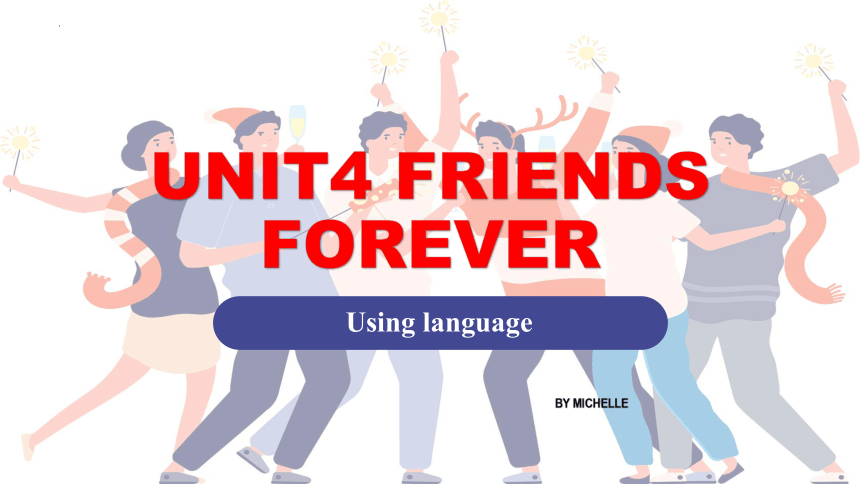 | |
| 格式 | pptx | ||
| 文件大小 | 11.0MB | ||
| 资源类型 | 教案 | ||
| 版本资源 | 外研版(2019) | ||
| 科目 | 英语 | ||
| 更新时间 | 2025-01-10 15:00:21 | ||
图片预览


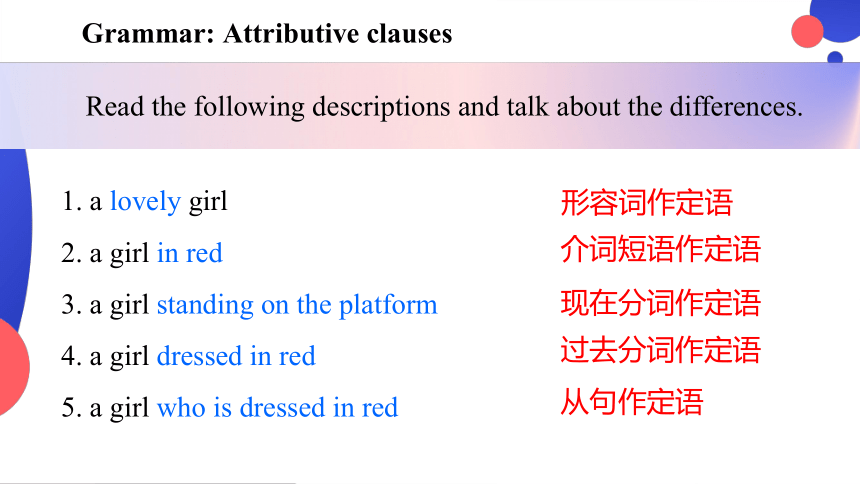
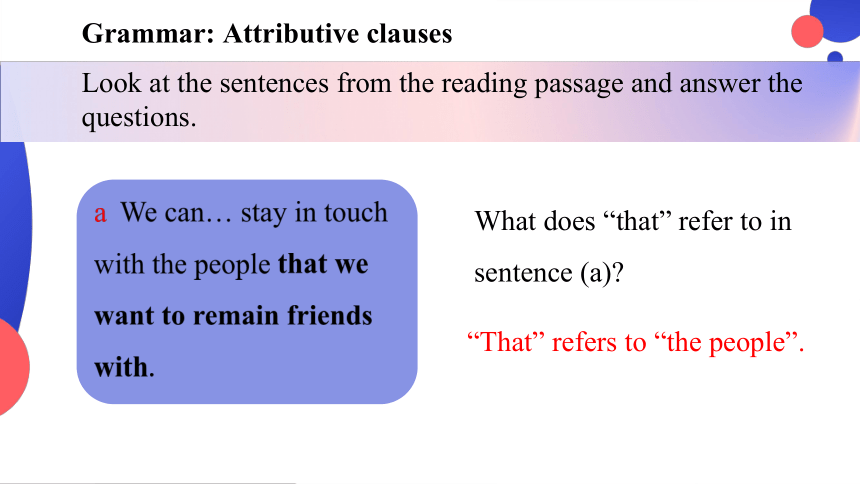
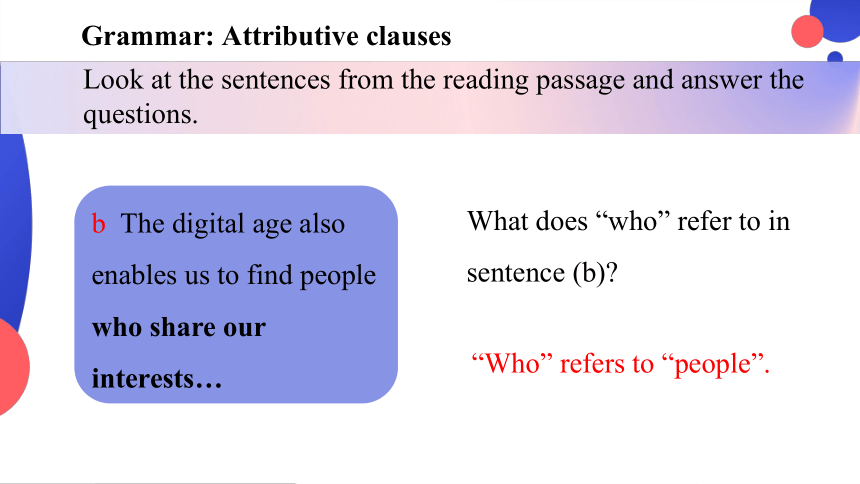
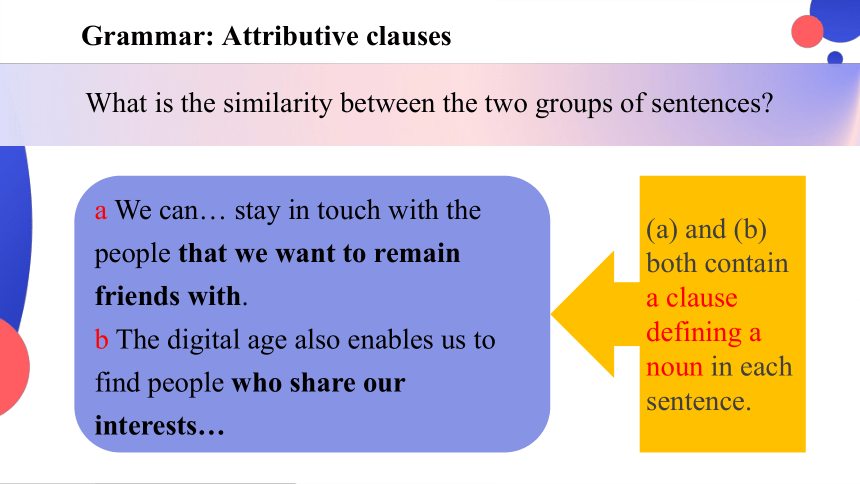
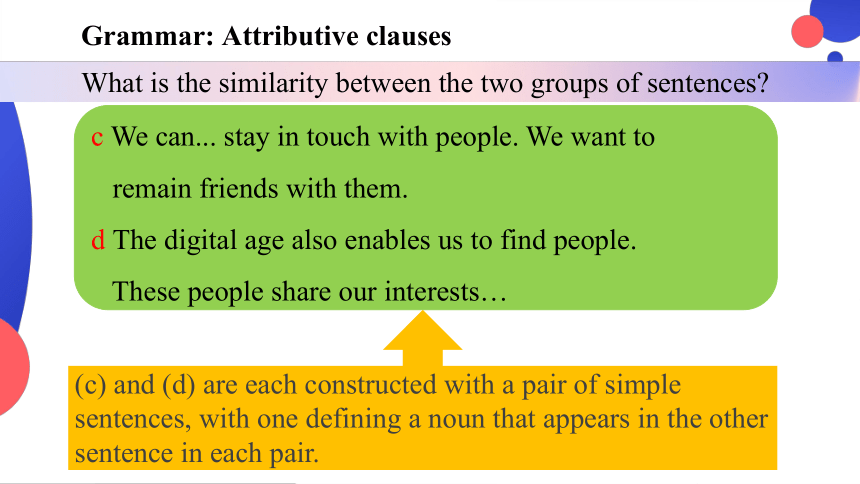
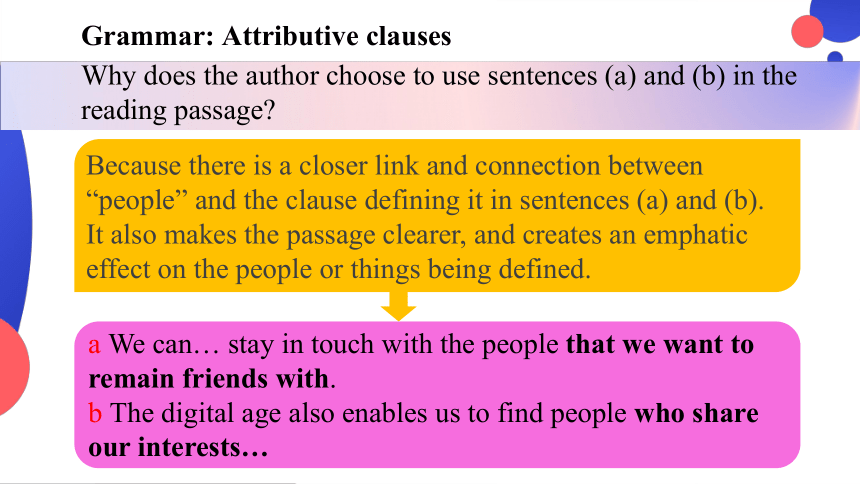
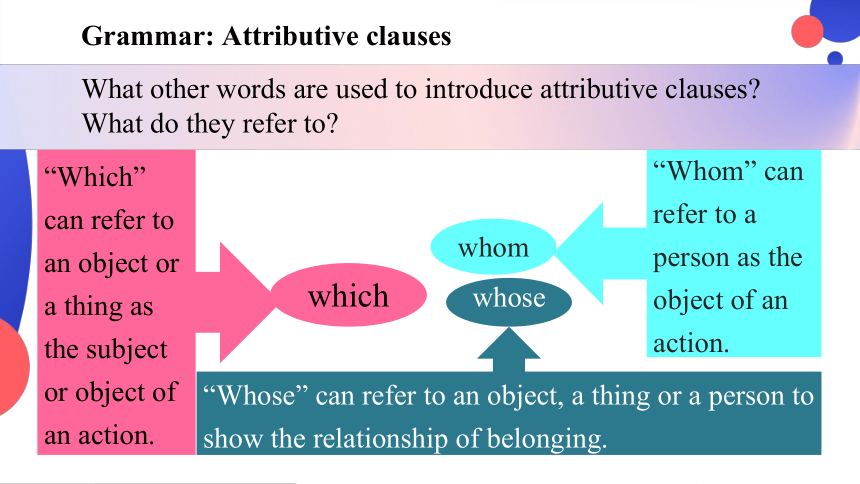
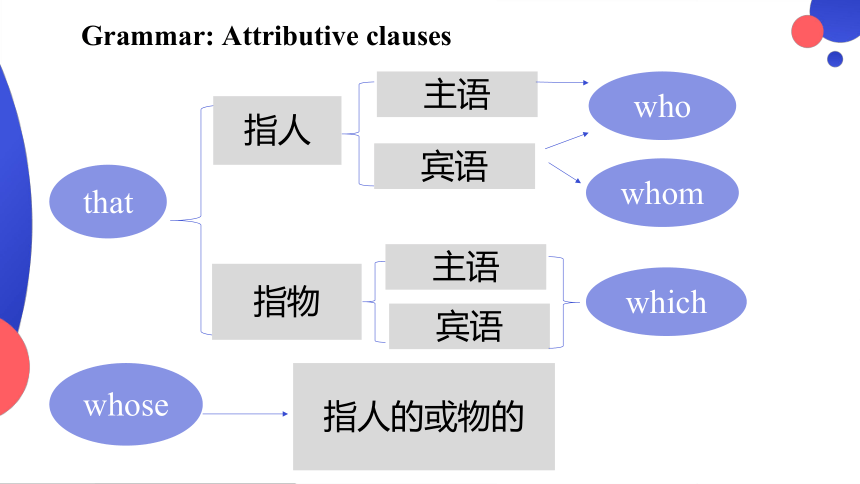
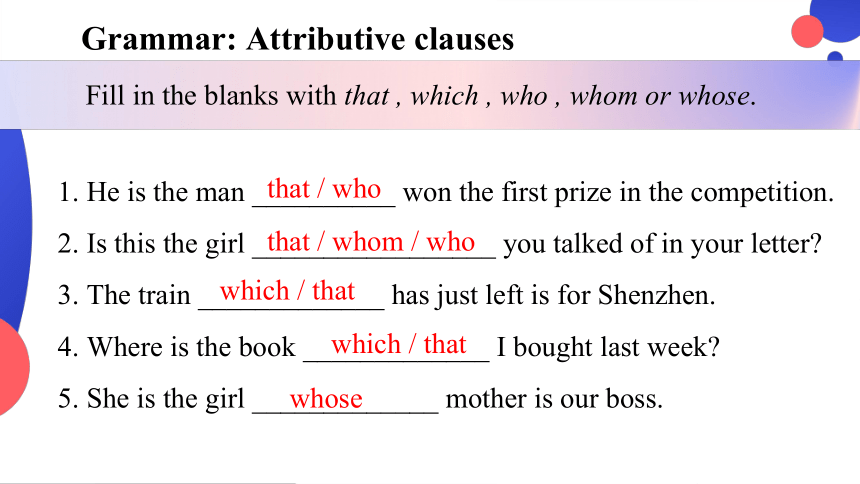
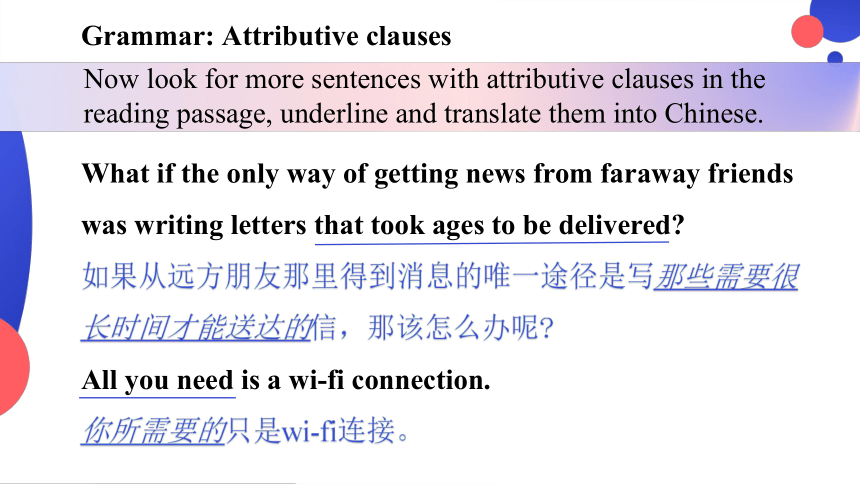
文档简介
(共31张PPT)
unit4 friends forever
Using language
BY MICHELLE
Grammar
01
Read the following descriptions and talk about the differences.
1. a lovely girl
2. a girl in red
3. a girl standing on the platform
4. a girl dressed in red
5. a girl who is dressed in red
形容词作定语
从句作定语
介词短语作定语
过去分词作定语
现在分词作定语
Grammar: Attributive clauses
Grammar: Attributive clauses
Look at the sentences from the reading passage and answer the questions.
a We can… stay in touch with the people that we want to remain friends with.
What does “that” refer to in sentence (a)
“That” refers to “the people”.
Grammar: Attributive clauses
Look at the sentences from the reading passage and answer the questions.
b The digital age also enables us to find people who share our
interests…
What does “who” refer to in sentence (b)
“Who” refers to “people”.
Grammar: Attributive clauses
What is the similarity between the two groups of sentences
a We can… stay in touch with the people that we want to remain friends with.
b The digital age also enables us to find people who share our interests…
(a) and (b) both contain a clause defining a noun in each sentence.
Grammar: Attributive clauses
What is the similarity between the two groups of sentences
c We can... stay in touch with people. We want to
remain friends with them.
d The digital age also enables us to find people.
These people share our interests…
(c) and (d) are each constructed with a pair of simple sentences, with one defining a noun that appears in the other sentence in each pair.
Grammar: Attributive clauses
Why does the author choose to use sentences (a) and (b) in the reading passage
a We can… stay in touch with the people that we want to remain friends with.
b The digital age also enables us to find people who share
our interests…
Because there is a closer link and connection between “people” and the clause defining it in sentences (a) and (b). It also makes the passage clearer, and creates an emphatic effect on the people or things being defined.
Grammar: Attributive clauses
which
whom
whose
“Which” can refer to an object or a thing as the subject or object of an action.
“Whom” can refer to a person as the object of an action.
“Whose” can refer to an object, a thing or a person to show the relationship of belonging.
What other words are used to introduce attributive clauses What do they refer to
Grammar: Attributive clauses
that
指人
指物
主语
宾语
主语
宾语
whose
who
whom
which
指人的或物的
Grammar: Attributive clauses
Fill in the blanks with that , which , who , whom or whose.
1. He is the man __________ won the first prize in the competition.
2. Is this the girl _________________ you talked of in your letter
3. The train _____________ has just left is for Shenzhen.
4. Where is the book _____________ I bought last week
5. She is the girl _____________ mother is our boss.
that / who
that / whom / who
which / that
which / that
whose
Grammar: Attributive clauses
What if the only way of getting news from faraway friends was writing letters that took ages to be delivered
如果从远方朋友那里得到消息的唯一途径是写那些需要很长时间才能送达的信,那该怎么办呢
All you need is a wi-fi connection.
你所需要的只是wi-fi连接。
Now look for more sentences with attributive clauses in the reading passage, underline and translate them into Chinese.
Grammar: Attributive clauses
Whatever our hobbies, the Internet can connect us with others who also enjoy doing them, even if they live on the other side of the world.
无论我们的爱好是什么,互联网可以把我们和那些同样喜欢做这些事的人联系起来,即使他们住在世界的另一端。
Now look for more sentences with attributive clauses in the reading passage, underline and translate them into Chinese.
Grammar: Attributive clauses
On social media sites, people tend to post only positive updates that make them appear happy and friendly.
在社交媒体网站上,人们倾向于只发布积极的更新,让自己看起来快乐和友好。
Now look for more sentences with attributive clauses in the reading passage, underline and translate them into Chinese.
Grammar: Attributive clauses
Walking group welcomes new members!
Walk and Talk is a group 1. __________ meets every Sunday. It is free to join. Walk and Talk is perfect for anyone 2. ______ weekends need some excitement. We are all teenagers 3. ________ love walking and making new friends.
We want you to join us! The next walk 4. ____________ is open to new members is on 22 July. You can also bring your friends. However, anyone 5. ____________ you bring must be over 12 years old.
Come along and join the fun!
that / which
whose
who / that
Complete the online forum post with that, which, who, whom or whose.
which / that
whom / who
Grammar: Attributive clauses
Lucy is my friend. She has a hearing problem. When she first came to my school, she seemed lonely, but we soon became friends. At first it was difficult to communicate with her. So I learnt a new language. It allows me to “speak” with my hands.
So I learnt a new language which / that allows me to “speak” with my hands.
Lucy is my friend who / that has a hearing problem.
Rewrite the underlined sentences with that, which, who, whom or whose.
Grammar: Attributive clauses
Lucy is a smart girl. Her ideas are always inspiring. I sometimes have problems. I can’t solve them. When this happens, I always ask Lucy for help. Lucy is a good listener. I enjoy sharing moments of my life with her.
Lucy is a smart girl whose ideas are always inspiring.
I sometimes have problems (that / which) I can’t solve.
Rewrite the underlined sentences with that, which, who, whom or whose.
Lucy is a good listener (whom / who / that) I enjoy sharing moments of my life with.
Vocabulary building
02
Vocabulary building: Keywords of friendship
Read the recipe and work out the meaning of the words in bold.
Vocabulary building: Key words of friendship
Read the recipe and work out the meaning of the words in bold.
Vocabulary building: Key words of friendship
Match the words in bold in Activity 4 to the dictionary entries.
_____________ noun [U] an act of being kind, especially by giving things to others
__________ noun [U] a feeling that shows you believe that someone is honest and fair
__________ noun [U] a strong feeling of love or interest
__________ noun [U] a quality that offers help to others
generosity
trust
passion
helpfulness
Vocabulary building: Key words of friendship
Match the words in bold in Activity 4 to the dictionary entries.
_____________ noun [U] words or actions that make people feel better
_____________ noun [U] the quality of being funny and understanding funny situations
_____________ noun [U] words or actions that give someone support and hope
_____________ noun [U] the ability to wait without becoming anxious or angry
comfort
humour
encouragement
patience
Vocabulary building: Key words of friendship
Work in pairs. Talk about the keywords of your “Friendship soup” and create your own e up with more words if you can.
Listening & speaking
03
Before listening
The word “friend” comes from the Old English word “freond”, meaning “the loved one”.
According to a study from Yale University and the University of California at San Diego in 2014, good friends are often genetically similar. In fact, good friends can share up to 1% of the same genes — as much as we might share with our great-great-great grandparents!
Suggestions
…….
……..
……..
Before listening
When you make a suggestion, use less direct language than you would to make a statement or give an order. This makes it clear to the other person that you are giving them a choice. For example, you can begin with expressions such as Why don’t we… How about… or use a past tense to distance yourself from the suggestion: I was wondering whether…
While-listening
Listen to the conversation and number the events in the correct
order.
Andy and Clara thought about postponing their trip.
Matt broke his leg.
Andy and Clara agreed on a plan.
Matt called Clara.
Andy, Clara and Matt decided to go to London.
Andy and Clara made a cardboard version of Matt.
4
2
5
3
1
6
While-listening
Listen again and complete the table.
Suggestion Comment
We could send him 1.__________ of the places we visit. That might make him 2.______________.
How about sending him 3._______________ from every place we visit They may 4._________ to arrive.
How about having a(n) 5. _________ with him at different places They aren’t 6. _______ in some places.
We can print Matt’s photo on a 7._________ cardboard cutout and take photos with it everywhere we go. It will feel like he’s there with us and Matt will 8. _______ at the photos.
photos
feel even worse
funny postcards
take days
video chat
allowed
life-sized
laugh
Speaking
discussion
Work in pairs. Act out the conversation to solve a problem between friends.
Student A: Turn to Page 82.
Student B: Turn to Page 85.
Review attributive clauses and do more exercises about them.
Memorize the words and expressions related to friendship and then try to use them to give suggestions to your friends.
Think about a problem that has come up between you and your friends and have a similar conversation.
【Homework】
THANKS FOR WATCHING
unit4 friends forever
Using language
BY MICHELLE
Grammar
01
Read the following descriptions and talk about the differences.
1. a lovely girl
2. a girl in red
3. a girl standing on the platform
4. a girl dressed in red
5. a girl who is dressed in red
形容词作定语
从句作定语
介词短语作定语
过去分词作定语
现在分词作定语
Grammar: Attributive clauses
Grammar: Attributive clauses
Look at the sentences from the reading passage and answer the questions.
a We can… stay in touch with the people that we want to remain friends with.
What does “that” refer to in sentence (a)
“That” refers to “the people”.
Grammar: Attributive clauses
Look at the sentences from the reading passage and answer the questions.
b The digital age also enables us to find people who share our
interests…
What does “who” refer to in sentence (b)
“Who” refers to “people”.
Grammar: Attributive clauses
What is the similarity between the two groups of sentences
a We can… stay in touch with the people that we want to remain friends with.
b The digital age also enables us to find people who share our interests…
(a) and (b) both contain a clause defining a noun in each sentence.
Grammar: Attributive clauses
What is the similarity between the two groups of sentences
c We can... stay in touch with people. We want to
remain friends with them.
d The digital age also enables us to find people.
These people share our interests…
(c) and (d) are each constructed with a pair of simple sentences, with one defining a noun that appears in the other sentence in each pair.
Grammar: Attributive clauses
Why does the author choose to use sentences (a) and (b) in the reading passage
a We can… stay in touch with the people that we want to remain friends with.
b The digital age also enables us to find people who share
our interests…
Because there is a closer link and connection between “people” and the clause defining it in sentences (a) and (b). It also makes the passage clearer, and creates an emphatic effect on the people or things being defined.
Grammar: Attributive clauses
which
whom
whose
“Which” can refer to an object or a thing as the subject or object of an action.
“Whom” can refer to a person as the object of an action.
“Whose” can refer to an object, a thing or a person to show the relationship of belonging.
What other words are used to introduce attributive clauses What do they refer to
Grammar: Attributive clauses
that
指人
指物
主语
宾语
主语
宾语
whose
who
whom
which
指人的或物的
Grammar: Attributive clauses
Fill in the blanks with that , which , who , whom or whose.
1. He is the man __________ won the first prize in the competition.
2. Is this the girl _________________ you talked of in your letter
3. The train _____________ has just left is for Shenzhen.
4. Where is the book _____________ I bought last week
5. She is the girl _____________ mother is our boss.
that / who
that / whom / who
which / that
which / that
whose
Grammar: Attributive clauses
What if the only way of getting news from faraway friends was writing letters that took ages to be delivered
如果从远方朋友那里得到消息的唯一途径是写那些需要很长时间才能送达的信,那该怎么办呢
All you need is a wi-fi connection.
你所需要的只是wi-fi连接。
Now look for more sentences with attributive clauses in the reading passage, underline and translate them into Chinese.
Grammar: Attributive clauses
Whatever our hobbies, the Internet can connect us with others who also enjoy doing them, even if they live on the other side of the world.
无论我们的爱好是什么,互联网可以把我们和那些同样喜欢做这些事的人联系起来,即使他们住在世界的另一端。
Now look for more sentences with attributive clauses in the reading passage, underline and translate them into Chinese.
Grammar: Attributive clauses
On social media sites, people tend to post only positive updates that make them appear happy and friendly.
在社交媒体网站上,人们倾向于只发布积极的更新,让自己看起来快乐和友好。
Now look for more sentences with attributive clauses in the reading passage, underline and translate them into Chinese.
Grammar: Attributive clauses
Walking group welcomes new members!
Walk and Talk is a group 1. __________ meets every Sunday. It is free to join. Walk and Talk is perfect for anyone 2. ______ weekends need some excitement. We are all teenagers 3. ________ love walking and making new friends.
We want you to join us! The next walk 4. ____________ is open to new members is on 22 July. You can also bring your friends. However, anyone 5. ____________ you bring must be over 12 years old.
Come along and join the fun!
that / which
whose
who / that
Complete the online forum post with that, which, who, whom or whose.
which / that
whom / who
Grammar: Attributive clauses
Lucy is my friend. She has a hearing problem. When she first came to my school, she seemed lonely, but we soon became friends. At first it was difficult to communicate with her. So I learnt a new language. It allows me to “speak” with my hands.
So I learnt a new language which / that allows me to “speak” with my hands.
Lucy is my friend who / that has a hearing problem.
Rewrite the underlined sentences with that, which, who, whom or whose.
Grammar: Attributive clauses
Lucy is a smart girl. Her ideas are always inspiring. I sometimes have problems. I can’t solve them. When this happens, I always ask Lucy for help. Lucy is a good listener. I enjoy sharing moments of my life with her.
Lucy is a smart girl whose ideas are always inspiring.
I sometimes have problems (that / which) I can’t solve.
Rewrite the underlined sentences with that, which, who, whom or whose.
Lucy is a good listener (whom / who / that) I enjoy sharing moments of my life with.
Vocabulary building
02
Vocabulary building: Keywords of friendship
Read the recipe and work out the meaning of the words in bold.
Vocabulary building: Key words of friendship
Read the recipe and work out the meaning of the words in bold.
Vocabulary building: Key words of friendship
Match the words in bold in Activity 4 to the dictionary entries.
_____________ noun [U] an act of being kind, especially by giving things to others
__________ noun [U] a feeling that shows you believe that someone is honest and fair
__________ noun [U] a strong feeling of love or interest
__________ noun [U] a quality that offers help to others
generosity
trust
passion
helpfulness
Vocabulary building: Key words of friendship
Match the words in bold in Activity 4 to the dictionary entries.
_____________ noun [U] words or actions that make people feel better
_____________ noun [U] the quality of being funny and understanding funny situations
_____________ noun [U] words or actions that give someone support and hope
_____________ noun [U] the ability to wait without becoming anxious or angry
comfort
humour
encouragement
patience
Vocabulary building: Key words of friendship
Work in pairs. Talk about the keywords of your “Friendship soup” and create your own e up with more words if you can.
Listening & speaking
03
Before listening
The word “friend” comes from the Old English word “freond”, meaning “the loved one”.
According to a study from Yale University and the University of California at San Diego in 2014, good friends are often genetically similar. In fact, good friends can share up to 1% of the same genes — as much as we might share with our great-great-great grandparents!
Suggestions
…….
……..
……..
Before listening
When you make a suggestion, use less direct language than you would to make a statement or give an order. This makes it clear to the other person that you are giving them a choice. For example, you can begin with expressions such as Why don’t we… How about… or use a past tense to distance yourself from the suggestion: I was wondering whether…
While-listening
Listen to the conversation and number the events in the correct
order.
Andy and Clara thought about postponing their trip.
Matt broke his leg.
Andy and Clara agreed on a plan.
Matt called Clara.
Andy, Clara and Matt decided to go to London.
Andy and Clara made a cardboard version of Matt.
4
2
5
3
1
6
While-listening
Listen again and complete the table.
Suggestion Comment
We could send him 1.__________ of the places we visit. That might make him 2.______________.
How about sending him 3._______________ from every place we visit They may 4._________ to arrive.
How about having a(n) 5. _________ with him at different places They aren’t 6. _______ in some places.
We can print Matt’s photo on a 7._________ cardboard cutout and take photos with it everywhere we go. It will feel like he’s there with us and Matt will 8. _______ at the photos.
photos
feel even worse
funny postcards
take days
video chat
allowed
life-sized
laugh
Speaking
discussion
Work in pairs. Act out the conversation to solve a problem between friends.
Student A: Turn to Page 82.
Student B: Turn to Page 85.
Review attributive clauses and do more exercises about them.
Memorize the words and expressions related to friendship and then try to use them to give suggestions to your friends.
Think about a problem that has come up between you and your friends and have a similar conversation.
【Homework】
THANKS FOR WATCHING
